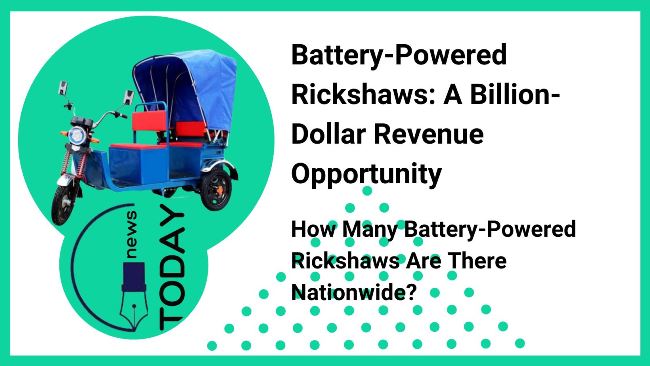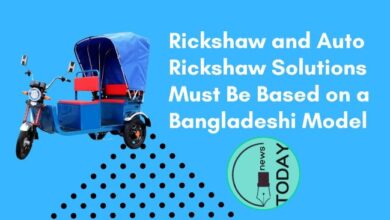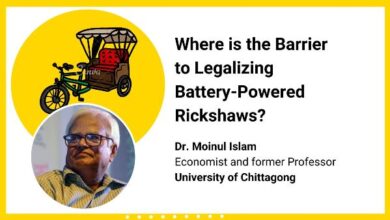Battery-Powered Rickshaws: A Billion-Dollar Revenue Opportunity

Battery-Powered Rickshaws Could Generate Billions in Revenue!
In Dhaka and across Bangladesh, the operation of battery-powered rickshaws has become chaotic, with mixed reactions from the public. Due to the lack of regulations, illegal trade around these vehicles thrives. To operate a rickshaw, drivers must purchase a token, often for a fee, but even with a token, hassle-free operation is not guaranteed. Beyond main roads, raids result in rickshaws being seized, and hefty towing fees ranging from 1,000 to 2,000 BDT are charged. If a rickshaw is taken to a dumping station, drivers must pay 2,000 to 5,000 BDT to reclaim it.
This lucrative racket involves not only the police but also unscrupulous local political leaders and neighborhood strongmen.
Just Look Back!
In 2014, the High Court ordered a ban on battery-powered rickshaws in Dhaka and Chittagong, followed by another directive in 2017. On December 15, 2021, the Supreme Court banned these rickshaws and prohibited their import. Despite occasional crackdowns by law enforcement and city corporations, a “cat-and-mouse” game continues over the presence of battery-powered rickshaws.
Frustrated by crackdowns, rickshaw drivers in Mirpur, Dhaka, attacked and vandalized at least seven traffic police boxes during the previous government’s tenure. In these clashes, a police constable was seriously injured, along with five other police officers. This unprecedented attack highlighted the deep-seated issues within this sector. Drivers from various parts of Dhaka have voiced that while they must regularly pay bribes, they still face constant harassment under the guise of raids.
How Many Battery-Powered Rickshaws Are There Nationwide?
According to various sources, there are approximately 9 million to 10 million battery-powered rickshaws across Bangladesh, including Dhaka. On February 8, 2024, in response to a question by Member of Parliament Shamim Osman, State Minister for Power Nasrul Hamid stated:
“These 4 million three-wheelers, I call them the ‘Tesla of Bengal.’” This news was prominently reported on the second page of Prothom Alo on February 9.
Dr. Moinul Islam, an economist and former professor of economics at Chittagong University, posed the question in a column titled “What’s Stopping the Legalization of Battery-Powered Rickshaws?”:
“If the government wants to encourage the rapid introduction of battery-powered rickshaws and auto-rickshaws, then in whose interest are they still considered ‘legally unauthorized’? Is it to maintain unjust laws that support traffic police corruption and political extortion?”
What Does the Rickshaw, Battery Rickshaw-Van, and Easybike Struggle Council Say?
Khalekuzzaman Lipon, the central coordinator of the Rickshaw, Battery Rickshaw-Van, and Easybike Struggle Council, said, “Although the High Court only banned these vehicles on highways, police are harassing drivers even in alleys and collecting money under various pretexts. Police receive a share of this money, apart from incidents of towing and dumping.”
He added, “In one court order, it was mentioned that 8 million easybikes and battery rickshaws are in operation nationwide. We estimate that this number has now reached 10 million, with over 1.5 million in Dhaka alone. Additionally, new battery-powered rickshaws hit the roads across the country daily. Each rickshaw earns an average of 1,500 BDT monthly from token fees, generating approximately 3 billion BDT in illegal revenue each month in Dhaka alone. We don’t have nationwide figures!”
A Source of Income for Marginalized Communities
A vast number of people depend on this sector for their livelihood. To address the issue, the government tasked BRTA with drafting a ‘Three-Wheeler and Similar Motor Vehicles Policy’ to legalize these vehicles temporarily. The current interim government’s stance on battery-powered rickshaws is yet unknown.
An estimate suggests that the battery-powered rickshaw industry generates at least 1 trillion BDT annually. This revenue includes 150 billion BDT in VAT contributions to the government.
Edited & translated from Daily Samakal for Consumer News Today




